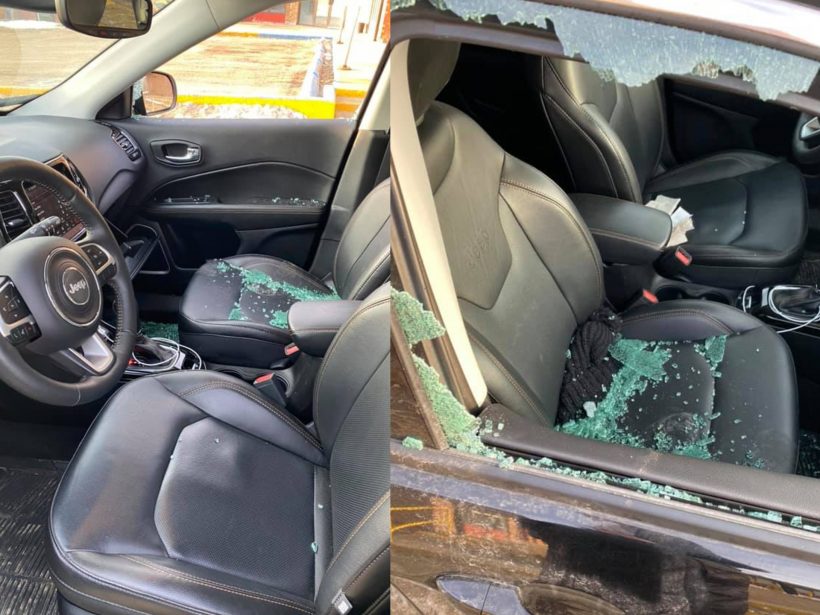Twenty-six vehicles at St. Paul’s Hospital in Saskatoon have been broken into or had their windows smashed in the past two weeks, according to an email from nurses who work there.

“Members are concerned this number may continue to increase with the current state of our province and COVID,” registered nurses wrote to the Saskatchewan Health Authority in an email supplied to Global News dated March 31.
Saskatoon Police Services said it is investigating these incidents and working with local groups to “create a strategy to best approach this activity.”
It’s unclear why vandalism in the area appears to be up. Saskatchewan’s first case of COVID-19, the disease caused by the novel coronavirus, was on March 12.
Katelyn Butz, a registered nurse at St. Paul’s Hospital, said her vehicle was one of several broken into over the weekend.
She spoke to Global News as a victim, not a representative of the hospital, the provincial health authority or a representative of the Saskatchewan Union of Nurses.
Butz said she’d parked in front of the hospital before her shift Saturday evening.
“After my 12-hour shift, I walked out to my vehicle and I saw glass shattered on the ground,” she said.
- 4 dead, 17 wounded after being caught in crossfire in entertainment district in Birmingham, Alabama
- Kenneth Law responsible for ‘luring’ Ontario teen into suicide death, parents allege
- Hundreds defrauded in door-to-door Ontario scam, Canada-wide warrants issued
- Quebec’s public security minister accuses gangs of using teens ‘to do their dirty work’
“My front passenger window had been smashed in, broken glass covered my seat floor, cup holders and dashboard. My glove box had been opened and they had searched through my console as well.”

Get daily National news
Butz said crime and violence is “nothing new” in the area and this was the second time her car has been vandalized in two months.
“There has always been ‘some’ concern and issue with vandalism, given the nature of where our facility is located,” said the email from registered nurses.
“But typically there hasn’t been 26 in a year, let alone a week or two.”
Butz said the vandalism is only adding to the stress health-care workers are feeling during the pandemic.
“I’m one of many health-care professionals that are currently working the front lines… to take care of patients during this scary time,” Butz said.
“If that’s not stressful enough, now we have to deal with having our vehicles broken into while we’re on shift? It’s just terrible.”
In an email response to the hospital’s registered nurses dated March 31, also provided to Global News, the Saskatchewan Health Authority said city police have “identified the subjects and are looking for them as we speak.”
“I can tell you that these individuals are responsible for at least 5 confirmed incidents with more likely to be added to the list,” wrote Curtis Grueter, manager of protective services with the authority.
In his email, Grueter said protective services officers are patrolling the hospital parkade and other parking areas “more frequently,” and door alarms are being placed on four exterior doors.
“I will be sending a memo to staff about entering and exiting the parkade to make sure they wait until the door closes behind them,” he said.
Support flooded in for Butz after she posted photos of her damaged car on Facebook. She said she got supportive messages from people across the country, and one man is working with Bulldog Glass in Saskatoon to cover the cost of all her repairs.
“It truthfully brought me to tears,” Butz said of the gesture. “It’s just completely restored my faith in humanity,” she said.
Questions about COVID-19? Here are some things you need to know:
Health officials caution against all international travel. Returning travellers across Canada are legally obligated to self-isolate for 14 days, beginning March 26, in case they develop symptoms and to prevent spreading the virus to others. In Saskatchewan, international travellers are already required to self-isolate for 14 days upon their return to the province.
Symptoms can include fever, cough and difficulty breathing — very similar to a cold or flu. Some people can develop a more severe illness. People most at risk of this include older adults and people with severe chronic medical conditions like heart, lung or kidney disease. If you develop symptoms, contact public health authorities.
To prevent the virus from spreading, experts recommend frequent handwashing and coughing into your sleeve. They also recommend minimizing contact with others, staying home as much as possible and maintaining a distance of two metres from other people if you go out.
For full COVID-19 coverage from Global News, click here.















Comments